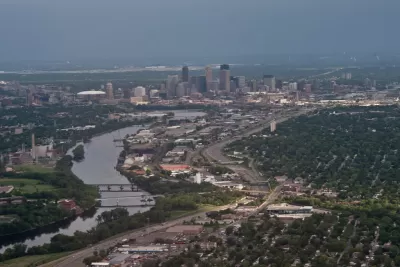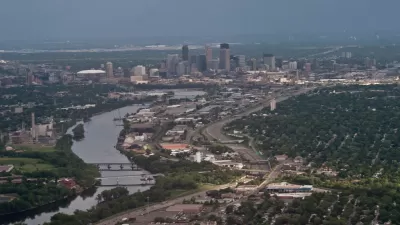A plan for 48 acres of riverfront land could make Minneapolis a leader in doing redevelopment right, argue city leaders.

The Minneapolis City Council on Friday approved a plan for the Upper Harbor Terminal, an industrial riverfront area north of downtown. Ahead of an earlier city council committee vote on the plan, Mayor Jacob Frey and Phillipe Cunningham, a member of the city council, made the case for the redevelopment project:
The sustained exclusion from opportunities afforded by the riverfront is a sad legacy that we simply must change. Done right, redevelopment of the Upper Harbor Terminal holds the opportunity to ensure that current residents benefit, that the area’s economy thrives and that the north Minneapolis riverfront is highlighted in deserving fashion.
The concept plan includes a performing arts center, green space, housing, a business center, and a utility hub. The plan, argue Frey and Cunningham, reflects an approach that ensures equity is part of the redevelopment process and demonstrates how other cities can maximize public investment while also addressing longstanding economic inequality.
"With 41 percent of the land designated for park use, plans for new employment opportunities, more affordable housing and a signature concert venue, Minneapolis has a chance to create a national model for equitable economic development that stabilizes community while expanding riverfront access," say Frey and Cunningham.
The plan has been controversial, with community and environmental advocates outlining a series of concerns about privatization of land, restricted public access to green space, and gentrification effects on surrounding neighborhoods.
Frey and Cunningham say they are committed to a collaborative planning process that will directly involve the community. "This is an undertaking of historic proportions, and part of changing history means we put north Minneapolis first and make sure North Side residents are involved in the planning process."
FULL STORY: Minneapolis development and economic equity: Upper Harbor Terminal can be a national model

Montreal Mall to Become 6,000 Housing Units
Place Versailles will be transformed into a mixed-use complex over the next 25 years.

Planetizen Federal Action Tracker
A weekly monitor of how Trump’s orders and actions are impacting planners and planning in America.

DARTSpace Platform Streamlines Dallas TOD Application Process
The Dallas transit agency hopes a shorter permitting timeline will boost transit-oriented development around rail stations.

Without International Immigrants, the Rural US Population Would Be Falling 58%
Census data shows that population growth in rural areas is due in large part to international migrants.

Dead End: Nine Highways Ready for Retirement
The Freeways Without Futures report describes the nation’s most promising highway removal proposals.

Congressman Proposes Bill to Rename DC Metro “Trump Train”
The Make Autorail Great Again Act would withhold federal funding to the system until the Washington Metropolitan Area Transit Authority (WMATA), rebrands as the Washington Metropolitan Authority for Greater Access (WMAGA).
Urban Design for Planners 1: Software Tools
This six-course series explores essential urban design concepts using open source software and equips planners with the tools they need to participate fully in the urban design process.
Planning for Universal Design
Learn the tools for implementing Universal Design in planning regulations.
City of Mt Shasta
City of Camden Redevelopment Agency
City of Astoria
Transportation Research & Education Center (TREC) at Portland State University
City of Camden Redevelopment Agency
Municipality of Princeton (NJ)
Regional Transportation Commission of Southern Nevada




























